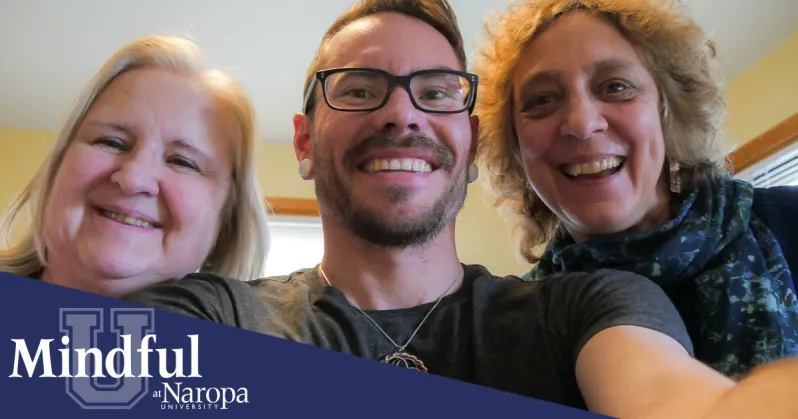
The newest episode of our university podcast, ‘Mindful U at Naropa University,’ is out on iTunes, and Stitcher now! We are excited to announce this week’s episode features Naropa faculty from our Interdisciplinary Studies program, Candace Walworth and Cynthia Drake.
 Episode 26 – Candace Walworth & Cynthia Drake: Interdisciplinarity–The Bricolage of a Naropa Education
Episode 26 – Candace Walworth & Cynthia Drake: Interdisciplinarity–The Bricolage of a Naropa Education
“I think of bricolage as an approach to interdisciplinary inquiry and to meaning-making. It comes from a French word meaning to tinker, and it’s sometimes associated with improvisation, and sometimes associated with ‘do-it-yourself’. I don’t like that term as much because it’s missing the collaborative aspect of interdisciplinary studies. Think about Levy Strauss observing craftspeople, noticing how they use materials left over from one project and creating something new. It’s a sense of giving birth to what does not yet exist; improvising and using tools; fashioning tools–creating tools that didn’t yet exist.” – Candace Walworth
Candace Walworth’s teaching and research interests include socially engaged spirituality, the socially engaged imagination, and the practice of dialogue in conflict transformation. She is a passionate community-engaged teacher and scholar working in Interdisciplinary Studies with concentrations in peace, social justice, and sustainability. She engages in collaborative projects with students that take them into the community and brings scholars, activists and social innovators into the classroom. Her current work builds on her dissertation (a biography) and her life-long love of narrative—from tiny forms like digital stories to oral histories and documentary.
Cynthia Drake began teaching in 1987 when she moved to Kyoto, Japan. Since then, she has taught English as a Foreign Language, college composition, literature, women’s studies, contemplative learning, and diversity in language schools, community colleges, and universities. Cynthia’s doctoral dissertation, “Dharma Kings and Flying Women: Buddhist Epistemologies in Early Twentieth-Century Indian and British Writing,” looks at the intersections of western interest in Buddhism, anti-colonial work, non-duality, and the complexity of liberational practices migrating to other cultures via cultural appropriation. Her ongoing research includes exploring literary forms that transmit non-duality, compassion, and the sacred.



